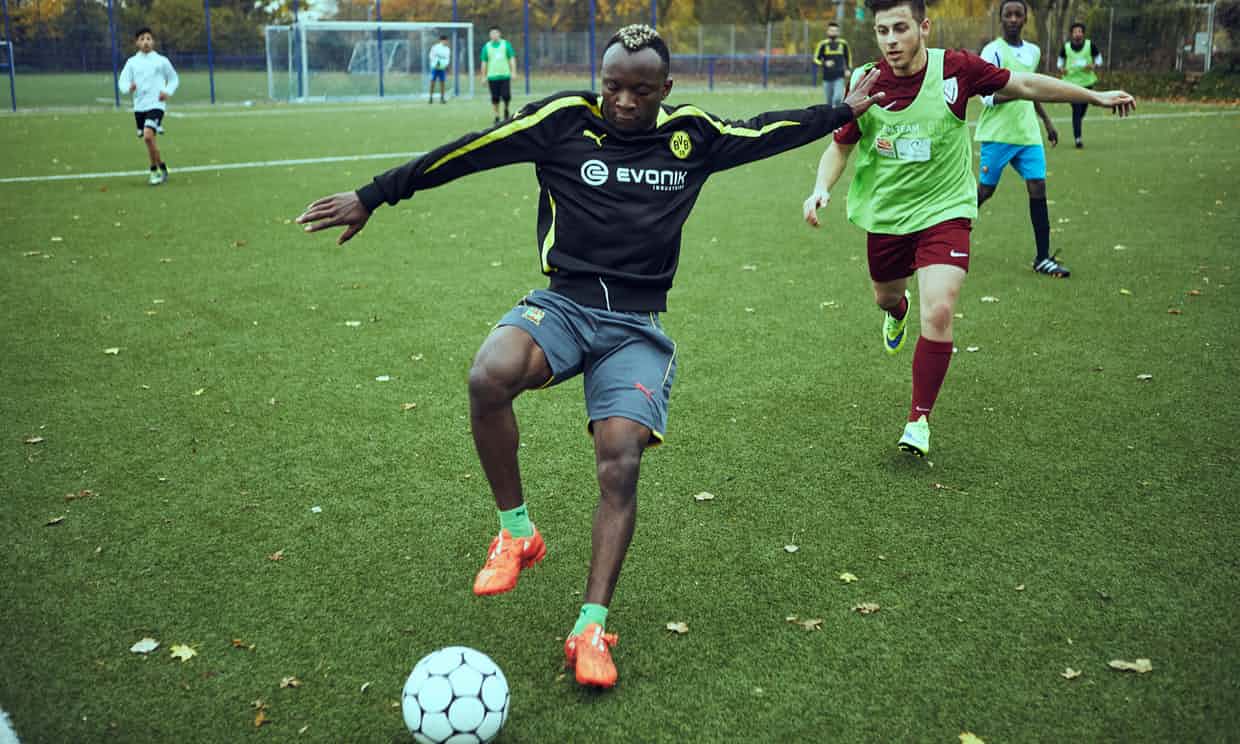
How Borussia Dortmund are helping to give refugees hope through football
The Bundesliga football club Borussia Dortmund is among two dozen German teams who have enthusiastically taken up a German Football League initiative that uses sport to help refugees integrate within the local community.
The Welcome to Football initiative was instigated by the German Football League (DFL) in September 2015 and has led to 24 of the country’s professional clubs running similar schemes to this one.
In conjunction with the local amateur side TSC Eintracht Dortmund and with funding from the DFL and the German Children and Youth Foundation, the club’s BVB Foundation has helped to create a project that is now in its third year and allows a group of refugees aged between 18 and 20 to attend a weekly training session at TSC’s stadium, where they also receive a free meal beforehand and a German lesson afterwards.
Students from refugee communities attending local schools are rewarded for good behaviour with a year-long place on the course, with organisers also helping to find them jobs and university places afterwards. As well as providing coaching and equipment, Dortmund continue to give away free tickets for their matches after famously inviting 220 refugees to a match in 2015.
“Three years ago, many refugees arrived in the city and we wanted to support them and the volunteers,” explains Thomas Klein, from Borussia Dortmund’s corporate social responsibility department.
“But as well as giving away tickets, we wanted to support something sustainable and were very glad when we heard about the idea from the DFL. It allowed us to create possibilities for the refugees to integrate into German culture and the community. We are very glad when a refugee comes to us and says, ‘Sorry I can’t come to training any more because I have a job’. That’s a great situation. We want to help the people who want to stay in Germany and integrate.”
After the launch of the campaign in 2015, several other Bundesliga sides have implemented similar initiatives, including Werder Bremen’s “Stay on the Ball” project and Bayer Leverkusen’s “Bayer 04 does school” – where the focus is on helping refugee children take steps to join a local club. Around 65 training sessions involving around 800 refugees aged between four and 30 take place in Germany every week, with as many as 600 having gone on to play in local amateur leagues.
Wolfgang Euteneuer, a former professional for VfL Bochum who now runs the Welcome to Dortmund charity that provides support to refugees in the city, believes the support of professional clubs has been hugely beneficial.
“In one case, BVB helped a young boy who was being sent back to Kosovo,” he recalls. “In his appeal, they wrote that he is always here playing football and learning German. When we went to his hearing in Düsseldorf, this paper helped persuade them to allow him to stay.”
Ali El-Kadri arrived in Germany in 2015 after fleeing his town just outside Damascus in Syria. It took him several months of travelling on his own via Turkey, Greece and Serbia using whatever means necessary to reach Dortmund. Now 19, he plans to go to university next year and has been using the opportunity to brush up on his football and language skills.
“I used to play in Syrian Under-17s team back home,” he says. “I love football and am always trying to get better so hopefully one day I can play for a big club like BVB. It was very hard to come here without my parents and learn a new language and a new culture. But this project has helped me improve my knowledge of German and make some new friends. That is important because you need to have a high level of German to be able to go to university. Playing football gives me the inspiration to do well in the rest of my life.”